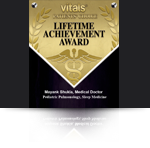Ready to Schedule an
Appointment with Dr. Shukla?
SLEEP APNEA
What Is Sleep Apnea?
Sleep apnea is a relatively common condition that affects your breathing while you sleep. Essentially, sleep apnea causes your breathing to pause or become shallow throughout the night. These interruptions in your normal breathing patterns can cause you to fall out of deep sleep and into light sleep, a pattern that is disruptive to your overall sleep cycle.
Interruptions in your sleep patterns can occur 30 or more times every night. This leads to conditions like chronic fatigue, and may cause more serious complications if left untreated. Snoring, snorting, and choking noises are usually produced by patients who suffer from sleep apnea.
Types of Sleep Apnea
There are two main types of sleep apnea: obstructive and central.
Obstructive sleep apnea is the more common of the two. It occurs when the throat muscles relax, causing an obstruction in the airway. A few factors can contribute to obstructive sleep apnea:
- Physical changes in the shape of the roof of your mouth or the air
- Obesity
- Enlarged tonsils or adenoids
- Neck size changed
Central sleep apnea occurs in the brain, when the signals that regulate your sleep patterns throughout the night are not sent. Central sleep apnea does not involve obstruction of the airway. Although it is comparatively rare, central sleep apnea occurs in conjunction with other health conditions. Central sleep apnea can, however, be associated with a few conditions, including:
- Drug-induced apnea
- Cheyne-Stokes breathing
- High-altitude sleep apnea
- Other medical conditions
Of course, the causes of your specific sleep apnea can vary, and only your doctor can help you determine the precise underlying cause.
Signs and Symptoms
Despite the fact that the condition is quite common, it can be difficult to know that you have sleep apnea. Like so many other types of sleeping disorders, usually, a bed partner or family member is the first to notice the signs of sleep apnea. (Does your significant other complain that you snore a lot? You may have sleep apnea!)
Typically, patients who suffer from sleep apnea snore loudly. Their breathing is usually shallow, and they may snort or cough during periods of obstruction. The more common type is obstructive sleep apnea, typically affects those who are overweight. However, even small children can suffer from this condition. Dr. Shukla is the New York area’s preeminent asthma doctor for kids.
If you are experiencing any of the following symptoms, it is time to see a doctor, regardless of whether you think your sleep apnea is central or not:
- Shortness of breath
- Hard time sleeping
- Fatigue
- Feeling sleepy during the day
Conditions Associated with Sleep Apnea
Sleep Apnea’s Associated Conditions
If left untreated, sleep apnea can lead to many more serious conditions. Patients with sleep apnea are at increased risk for developing:
- High Blood Pressure
- Heart Attack
- Stroke
- Obesity
- Diabetes
- Heart Failure
- Arrhythmia (Irregular Heartbeat)
In addition, disrupted sleep patterns can cause fatigue during the day. When your sleep is interrupted throughout the night, it can obviously make you drowsy during the day. This can put you at increased risk for having a car or workplace accident. Learn about how good sleep hygiene that can improve your quality of sleep.
Sleep Apnea Treatment
Because sleep apnea is a chronic condition, long-term management strategies are usually required. These may include changes to your lifestyle, mouthpieces, breathing devices, and/or surgery. Proper sleep apnea treatment can restore your regular breathing pattern during the night, relieving your snoring and allowing you get a good night’s sleep.
Dr. Mayank Shukla has been treating patients of all ages who suffer from sleep apnea for more than 15 years. He can provide you with a number of sleep apnea treatment options to let you get the restful sleep you need. In addition, he may recommend a number of lifestyle changes.
At Home Treatment
Lifestyle choices can dramatically impact your sleep apnea. Here are a few tips to help you manage the condition that will come into play in any serious treatment regime.
- Alcohol and medicines that cause drowsiness can make the muscles in the throat relax. Avoiding these substances can greatly improve your condition
- Obesity is a major cause of sleep apnea. Making lifestyle changes that help you lose weight should improve your sleep apnea and many of the health conditions associated with it
- Quitting smoking will help reduce symptoms
- Sleeping on your side instead of your back helps to keep the throat open during the night
- Nasal sprays and nasal strips that keep the nasal passages open can also help you breathe easier during the night
A successful treatment plan to address your sleep apnea will, among other things, surely involve actions on your part. You are a key to your recovery, and making lifestyle changes is a part of that process for many.
Awards and Recognition
Dr. Mayank Shukla Top-Rated Pulmonologist 2018 - 2025
















